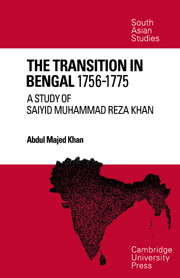Book contents
- Frontmatter
- Contents
- Map of the Mughal Subah of Bengal, Bihar and Orissa in the eighteenth century
- Preface
- List of Company servants with their Mughal titles
- List of abbreviations
- 1 Introduction: the twilight of Mughal Bengal
- 2 The early life of Reza Khan and his first public office in 1756
- 3 The involvement in politics, 1760–1763
- 4 The Naibat at Dacca, 1763–1765
- 5 The Naibat Subahdari at Murshidabad, 1765
- 6 Reza Khan at the zenith of his power, 1765–1767
- 7 The early reverses, 1767–1768
- 8 Conflict of interests: opposition to trade monopolies and proposal for supervisorships, 1769
- 9 The conflict deepens, 1769–1770
- 10 The rearguard action and Reza Khan's arrest, 1770–1772
- 11 The ‘Inquisition’, 1772–1775
- Select bibliography
- Index
- Plate section
10 - The rearguard action and Reza Khan's arrest, 1770–1772
Published online by Cambridge University Press: 29 October 2009
- Frontmatter
- Contents
- Map of the Mughal Subah of Bengal, Bihar and Orissa in the eighteenth century
- Preface
- List of Company servants with their Mughal titles
- List of abbreviations
- 1 Introduction: the twilight of Mughal Bengal
- 2 The early life of Reza Khan and his first public office in 1756
- 3 The involvement in politics, 1760–1763
- 4 The Naibat at Dacca, 1763–1765
- 5 The Naibat Subahdari at Murshidabad, 1765
- 6 Reza Khan at the zenith of his power, 1765–1767
- 7 The early reverses, 1767–1768
- 8 Conflict of interests: opposition to trade monopolies and proposal for supervisorships, 1769
- 9 The conflict deepens, 1769–1770
- 10 The rearguard action and Reza Khan's arrest, 1770–1772
- 11 The ‘Inquisition’, 1772–1775
- Select bibliography
- Index
- Plate section
Summary
Despite the temporary restoration to full authority of Becher, Cartier and others of the Clive school in the autumn of 1770, Reza Khan made no attempt to restore the old Mughal revenue structure. He could no longer hope to exclude the supervisors and their attendant Banians and gumashtahs from the districts, and rather than suffer a dual authority in the countryside he recalled his amils and abandoned the field.
But though he had yielded ground in the diwani he was still firmly resolved to defend those other areas of Mughal authority in the Nizamat. This he made clear when on 1 October 1770, at his first meeting of the Murshidabad Controlling Council of Revenue, he asked how he was to conduct himself ‘in the administration of justice in general and relative to criminal cases in particular’. The question was not just an administrative point: Reza Khan was reminding Reed and his Council that their legitimate power did not extend beyond the diwani, and that the Khan, Naib Nazim, though formally designated now as Naib Diwan, could not be treated merely as a servant of the Company.
Murshidabad referred the question to the Calcutta Council. However on 22 October they proceeded to prejudge the issue by laying down that all criminal cases should be tried in the existing faujdari Adalat, but that sentences before execution should have the approval of the Council. It was further decided that causes relating to property in land and to revenue should be referred to the Khalsa cutcheri, and causes for debt to a different Adalat, these two courts to be constituted of all the members of the Murshidabad Council.
- Type
- Chapter
- Information
- The Transition in Bengal, 1756–75A Study of Saiyid Muhammad Reza Khan, pp. 264 - 296Publisher: Cambridge University PressPrint publication year: 1969

